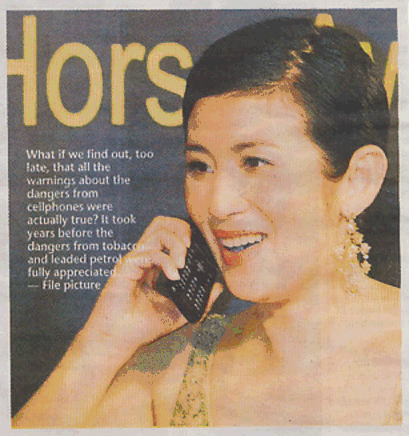We should learn from lessons learnt
Professor Tan Sri Dato' Dzulkifli Abd Razak
Comment
New Sunday Times - 10/12/2008
SPOOFED! You're cooked and fried" read a recent headline (NST, Oct 5).
Apparently, to spoof someone is as easy as buying an envelope, putting a stamp on it and writing a return name and address that's not your own, according to an information technology expert. We have been reminded yet again not to trust everything that we read digitally.
What about the email on how to make a hard-boiled egg using a mobile phone? A spoof? Maybe.
How about the recent testimony by scientists warning the US Congress on cancer risks for cellphone users?
Comment
New Sunday Times - 10/12/2008
SPOOFED! You're cooked and fried" read a recent headline (NST, Oct 5).
Apparently, to spoof someone is as easy as buying an envelope, putting a stamp on it and writing a return name and address that's not your own, according to an information technology expert. We have been reminded yet again not to trust everything that we read digitally.
What about the email on how to make a hard-boiled egg using a mobile phone? A spoof? Maybe.
How about the recent testimony by scientists warning the US Congress on cancer risks for cellphone users?

What if it comes from Ronald Herberman, the director of the University of Pittsburgh Cancer Institute, arguably one of the top US cancer research centres?
Herberman was quoted as saying that most studies "claiming that there is no link between cellphones and brain tumours are outdated, had methodological concerns and did not include sufficient numbers of long-term cellphone users".
Those who are familiar with another controversy, that of tobacco and cancer which had been raging for decades, will have a sense of de jevu when it comes to the current controversy.
Just like tobacco-linked cancer, the evidence then was shrouded by commercial interests, providing "false" comfort to tobacco users about their future health.
Only after long-drawn out battles of about 50 years between health activists and Big Tobacco did the truth finally surface—that tobacco indeed kills, period!
Indeed, Herberman recalled other incidences as well, relating to the removal of lead from paint and petrol (think, leaded petrol) which took about 70 years before it was recognised as a health hazard.
In other words, while the debates drag on, many will continue to be unknowingly exposed to the possible dangers of cellphones purely because of the alleged uncertain level of dangers of the magnetic field emitted by cellphones on biological tissues.
Based on the years of experience with tobacco research, such "uncertainties" are at times purposely in-built and meant to derail governments and policy-makers in making firm decisions against the deadly products.
Hence, rather erring on the side of precaution, policy-makers often tend to take the side of commercial interests and not the people.
It could be the same situation with handphones should we fail to learn from the past, until perhaps it is too late. By then, instead of damage to the lung, it would be the brain that would have been "cooked and fried" by the cellphones, especially at a tender age.
In the words of David Carpenter, director of the Institute of Health and Environment at the University of Albany, in testimony before a subcommittee of the US House of Representatives Committee on Oversight and Reform, we must not wait until every "i" is dotted and every "t" is crossed before
warnings are issued.
Reportedly, the committee were shown documents from various sources as back-up.
A 2008 study by Swedish cancer specialist, Lennart Hardell, purported that frequent cellphone users are twice as likely to develop a benign tumour on the auditory nerves of the ear most used with the handset, compared with the other ear.
Another is a paper published as late as last month by the Royal Society in London which found that adolescents who start using cellphones before the age of 20 were five times more likely to develop brain cancer by the age of 29 than those who did not use a cellphone.
Yet another paper in Israel, suggests that heavy cellphone users had a 50 per cent increased likelihood of developing a salivary gland tumour.
If all these claims sound hollow, especially to cellphones users, it is because, like tobacco-related lung cancers and lead-induced mental retardation,
the long-term impairment to the brain will takes years to cause any social impact in a big way.
In fact, it is interesting that Carpenter mentioned that the many studies denying a link to similar health hazards were based on "once-a-week" cellphone use!
Similar damning evidence were fully reported in tobacco industry secret documents negating the health hazards of tobacco use.
And it could be as blatant as the heads of tobacco companies pleading ignorance about the addictive properties of tobacco.
Such incidences should serve to jolt our memory as to the uphill battle that must be waged if we are serious in providing health protection to the general public. Unless, of course, we adamantly refuse to heed the tragic lessons of the past that could have otherwise saved millions from grievous, preventable injuries and fatalities.
So why not, for a start, make health warning labels mandatory for cellphones —just like we do now for tobacco?
It can't be that difficult to protect health and save lives, if we really care. Certainly, we don't want to be cooked and fried before we realise too late the inherent danger.
